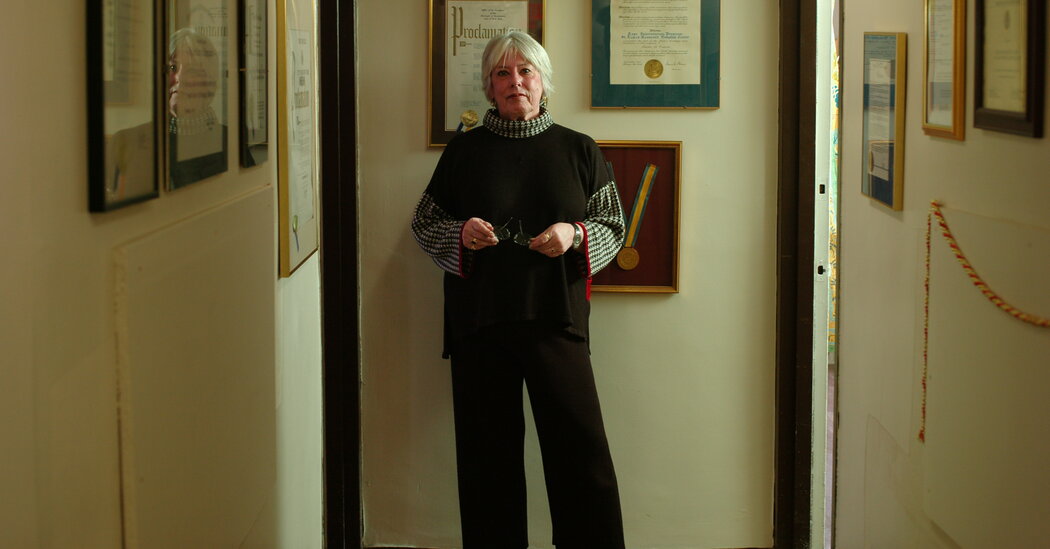Susan Xenarios, a founder of New York City’s first rape crisis center, who ran the organization for four decades and helped transform how the law, hospitals and the police respond to rape survivors after own experience of a sexual assault, died on Sept. 6 at her home in Manhattan. She was 79.
Roberta Sklar, a friend, said the cause was cancer.
In November 1974, Ms. Xenarios was a 28-year-old social worker when she entered an apartment building in Harlem to investigate a report about a missing baby. A man attacked her in the stairwell, held a knife to her throat, dragged her to the roof and threatened to toss her over.
“You really don’t want to do this,” she kept saying calmly, she recalled to The New York Times decades later. He raped her, ran away and was never caught. Shaken, Ms. Xenarios staggered to a previously scheduled meeting but was so distraught that she collapsed midway through it.
There were no special services for rape survivors in New York City at the time. Ms. Xenarios said she was treated indifferently by the police and an emergency room doctor. She became angry trying to reckon psychologically with the assault, including its impact on her husband.
It was an era when many women who experienced the violation of rape never reported or spoke of it, and legal reforms of the early 1970s meant to make rape cases easier to prosecute were just beginning to be felt.
In 1977, Ms. Xenarios and an emergency room administrator founded the Rape Intervention Program at St. Luke’s Hospital in Upper Manhattan (now Mount Sinai Morningside). Attached to the hospital’s emergency room, it provided forensic evidence collection kits and volunteer counselors who held rape victims’ hands, explained the medical procedures they could expect and offered fresh clothes to wear home.
“Some women talk about rape as the murder of the soul,” Ms. Xenarios told The Times in 2007, when the center had grown to a full-time staff of 11 with 110 volunteers. “We wanted medical competence, psychological competence, validation that a person who was raped was still a significant human being, and above all, compassion.”
Ms. Xenarios realized that by training a corps of volunteers, she could offer a round-the-clock, at-the-ready advocate when a rape survivor came into an emergency room. That became the model for rape-crisis centers citywide.
She also initiated training for doctors and nurses in how to collect forensic evidence and to offer empathetic care, known as the Sexual Assault Forensic Examiner program. It is a template that the New York Department of Health recommends for hospitals throughout the state.
“She had a huge impact on what the hospitals’ responses were to survivors,” said Mary Haviland, a former executive director of the New York City Alliance Against Sexual Assault. “Doctors didn’t’ know how to react to them. They didn’t how to interact with them.”
The St. Luke’s program became the city’s first rape crisis center to offer psychiatric consultation. It was one of the first to serve male victims of sexual assault as well as those assaulted in jails and prisons.
The program eventually changed its name, becoming the Crime Victims Treatment Center, a reflection of its broadening mission serving victims of domestic violence, childhood sexual abuse and sex trafficking.
Ms. Xenarios was also a driving force behind changing New York State laws that had once made prosecuting sex crimes difficult, including requiring victims to present a “corroborating” witness. In 1993, she successfully campaigned for a law to protect the confidentiality of what a survivor might tell a rape crisis counselor. In 2003, she and others, including gay rights groups, persuaded lawmakers to strike the 19th-century terms “sodomy” and “deviate sexual intercourse” from state statues.
“It has been excruciating for a woman who has been raped to be told, read in the papers, have to sign complaints and testify on the stand that she was ‘sodomized’ or subjected to ‘deviate sexual intercourse,’” Ms. Xenarios said at the time. “These words only exacerbate the trauma and have kept some victims from pressing forward.”
After years of lobbying by Ms. Xenarios and others, New York in 2007 passed a law to crack down on sex trafficking and to offer victims counseling and other services.
She went on to work for the successful passage in 2015 of New York’s “Enough is Enough” law, which addresses sexual violence on college campuses; it was one of the first legislative measures in the nation to require both parties to give affirmative consent to sexual activity.
“She was one of the most effective advocates that the community she served ever had,” said Joseph R. Lentol, a former longtime member of the New York Assembly from Brooklyn. “She didn’t take no for an answer. She was a tough lady.”
Susan Jane Preston was born on Aug. 8, 1946, in Englewood, N.J., to George and Mildred (Anders) Preston. Her father was a retired Army colonel who managed a bookstore. She received a bachelor’s degree in sociology from Fairleigh Dickinson University in 1968 and a master’s degree in social work from Columbia University in 1982.
She married George Xenarios, a jeweler she had met in Mykonos, Greece, in 1974. He died in 2002. She is survived by a daughter, Elena Xenarios; a brother, William Preston; and two sisters, Carol Hastie and Nancy Preston.
Ms. Xenarios defied the burnout of others in her emotionally demanding field. She retired in 2017, after 40 years leading the program she had helped found. A decade earlier, when asked about retirement plans, she had said: “I can do another 30 years if I had to. What people don’t understand about this work is that human resiliency is inspiring.”
